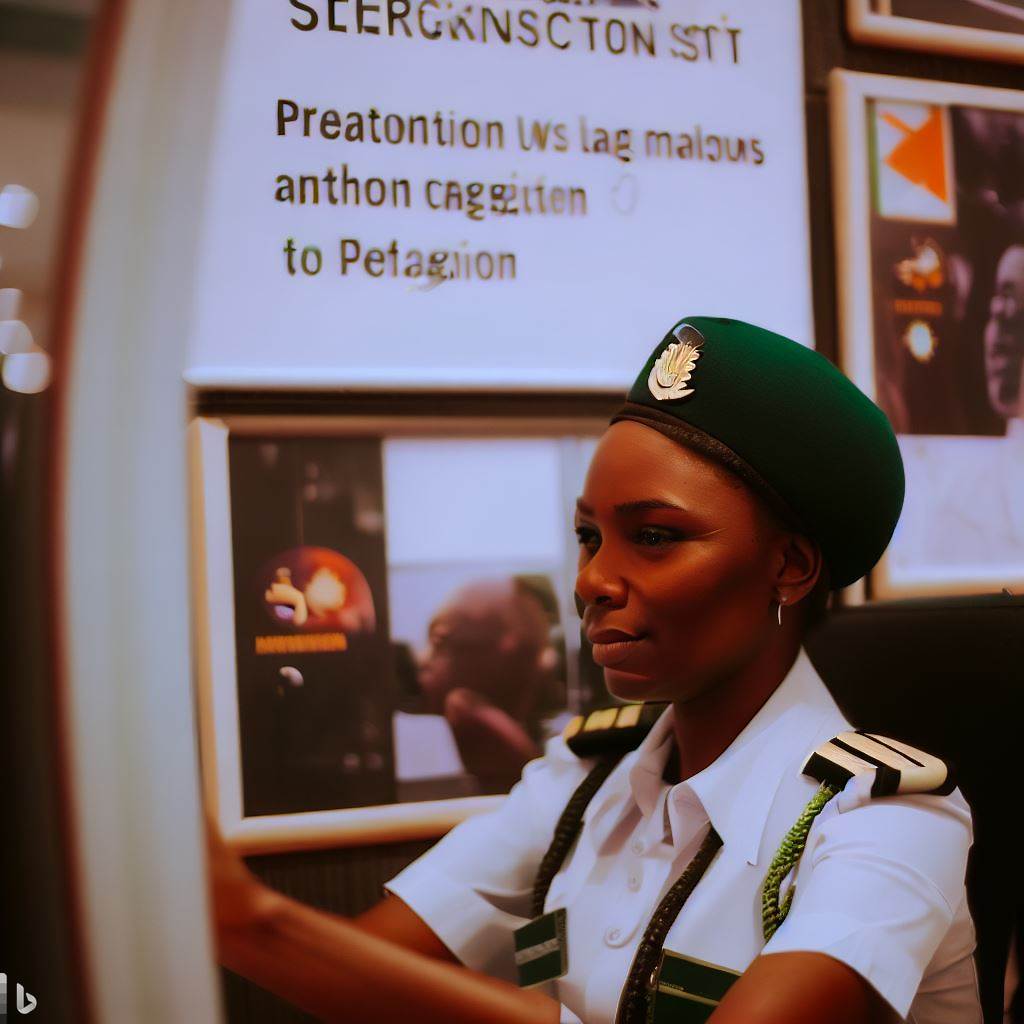Introduction
Becoming a pilot in Nigeria is an exciting journey that requires determination, dedication, and a passion for flying. Nigerian aviation industry is growing rapidly, leading to an increase in demand for pilots. In this guide, we’ll walk you through the steps to become a pilot in Nigeria.
The Importance of Becoming a Pilot in Nigeria:
Pilots play a vital role in the Nigerian aviation industry. They are responsible for ensuring the safety of passengers, crew members, and aircraft.
The aviation industry is an important sector in the Nigerian economy, with many job opportunities available for pilots.
A career as a Nigerian pilot is not only financially rewarding, but it is also a great opportunity to see the world and gain unique experiences. By becoming a pilot in Nigeria, you can also contribute to the growth of the industry and help shape its future.
Becoming a pilot in Nigeria requires hard work, patience, and perseverance. It is a challenging but rewarding career that offers great opportunities for personal and professional growth. If you have a passion for flying, then pursuing a career as a pilot in Nigeria may be the right path for you.
Read: Nigeria’s Aviation Sector: Salary and Compensation
Education and Requirements
To become a pilot in Nigeria, there are certain educational and training requirements that must be met. Here are the basic education requirements:
Basic education requirements
- Have a minimum of five credits in WAEC, GCE, or NECO
- Must include Mathematics, English Language, Physics, and Chemistry
- Minimum age of 17 years old
Aside from these basic requirements, there are additional qualifications that must be met to become a pilot:
Additional requirements for becoming a pilot
- Complete a medical examination to obtain a medical certificate
- Must have a valid Nigerian Passport
- Attend a flight school to undergo formal flight training
- Obtain a private pilot license (PPL)
- Complete 1500 hours of flight time to obtain a commercial pilot license (CPL)
There are many flight schools in Nigeria to choose from. Here are some of the best schools for aviation training in Nigeria:
Best schools for aviation training in Nigeria
- International Aviation College, Ilorin
- Nigerian College of Aviation Technology (NCAT), Zaria
- Landover Aviation Business School, Lagos
- ALP Aviation, Lagos
- Globe Aviation Academy, Lagos
The International Aviation College, Ilorin, is a leading aviation school in Nigeria that offers a Bachelor of Science degree in Aviation. NCAT, Zaria, is a government-owned aviation school that offers various aviation courses, including Air Traffic Services and Aircraft Maintenance.
The Landover Aviation Business School, Lagos, offers courses in Cabin Crew, Ground Operations, and Dispatch. ALP Aviation, Lagos, offers pilot training programs for PPL and CPL. Globe Aviation Academy, Lagos, offers courses in Aircraft Maintenance, Ground Handling, and Flight Dispatch.
Essentially, becoming a pilot in Nigeria requires meeting the basic education requirements, passing a medical examination, attending a flight school, obtaining a PPL, and completing the required flight hours to obtain a CPL.
Aspiring pilots can choose from several aviation schools in Nigeria to acquire the necessary training and qualifications needed to achieve their dream career as a pilot.
Read: Decoding Aviation Licensing in Nigeria
Choosing a Career Path
When it comes to choosing a career path as a pilot in Nigeria, there are several options available, each with its unique features and requirements. Here are some of the types of jobs available for pilots:
- Commercial Pilot: This type of pilot is responsible for operating cargo or passenger planes and is often employed by airlines. To become a commercial pilot, one must have a Commercial Pilot License (CPL), which requires extensive training and flight experience.
- Private Pilot: A private pilot operates small aircraft for personal use and is not authorized to operate large commercial planes or transport passengers or cargo. To become a private pilot, you need a Private Pilot License (PPL).
- Military Pilot: Military pilots serve in the armed forces and fly military aircraft. To become a military pilot, you need to meet the specific requirements of the military branch you want to serve in.
- Charter Pilot: Charter pilots transport people or cargo to specific destinations using small planes, such as helicopters, corporate jets, and turboprops.
- Bush Pilot: Bush pilots are responsible for transporting people, mail, and supplies to remote areas with little infrastructure, such as national parks and forests. This type of pilot requires specialized training and experience.
In addition to the different types of pilot jobs available, there are also differences between commercial and private pilots.
As discussed earlier, a private pilot is restricted to operating small aircraft for personal use only, while a commercial pilot has the authorization to operate large commercial planes used to transport people and cargo.
Choosing a career path as a pilot can be a daunting task. Here are some factors to consider before making a final decision:
- Education: What level of education do you possess? Some pilots start as early as high school and proceed to aviation college, while others obtain their degree in aviation management or other related fields.
- Experience: The flying experience required to become a pilot varies depending on the type of job. For example, a military pilot requires a certain amount of time in-service, while a commercial pilot needs a given number of flight hours.
- Personal preferences: Consider what type of lifestyle you want to live as a pilot. Do you want to be based in one place as a commercial pilot or fly to different places often as a charter pilot?
- Financial considerations: It’s no secret that becoming a pilot requires substantial financial investment. Before you pursue a career as a pilot, consider how the associated costs of training will impact your finances.
- Job security: Finally, consider the stability of the job you are pursuing. Different types of pilot jobs have different levels of job security.
In fact, choosing a career path as a pilot in Nigeria requires careful consideration of what you want out of your career.
Whether you choose to become a military pilot, a commercial pilot, or a private pilot, the journey will be challenging, but the rewards are significant.
Make sure to research each type of job thoroughly, consider your skills, preferences, and finances, and pursue the path that best aligns with your goals.

Getting a License
After completing the necessary training requirements, the next step in becoming a pilot is obtaining a license.
This license allows the pilot to legally operate an aircraft in Nigeria and beyond. Here’s a comprehensive guide to the process of obtaining a pilot license in Nigeria:
Process of Obtaining a Pilot License
- Submit your application to the Nigerian Civil Aviation Authority (NCAA).
- Provide the necessary documentation including proof of age, educational qualifications, medical certificates, and logbook.
- Pass a written examination covering topics such as airspace, meteorology, and aircraft general knowledge.
- Complete a flight test with a designated examiner from the NCAA or approved aviation school.
- Upon successful completion of the written exam and flight test, the pilot will be issued a license.
Types of Pilot Licenses in Nigeria
There are several types of pilot licenses in Nigeria. The type of license required depends on the type of aircraft and the pilot’s experience level. Here are the different types of pilot licenses:
- Private Pilot License (PPL) – This license allows the pilot to fly a single-engine aircraft for leisure or personal purposes.
- Commercial Pilot License (CPL) – This license allows the pilot to fly for hire or reward.
- Airline Transport Pilot License (ATPL) – This license allows the pilot to act as the pilot-in-command of a multi-crew aircraft.
- Light Aircraft Pilot License (LAPL) – This license allows the pilot to fly light aircraft with a maximum takeoff weight of 2000kg.
Cost of Obtaining a License
The cost of obtaining a pilot license in Nigeria can vary depending on factors such as the type of license, the aviation school, and the pilot’s experience level. However, here’s an estimate of the cost:
- Private Pilot License (PPL) – ₦2,000,000 – ₦3,000,000
- Commercial Pilot License (CPL) – ₦5,000,000 – ₦12,000,000
- Airline Transport Pilot License (ATPL) – ₦15,000,000 – ₦25,000,000
- Light Aircraft Pilot License (LAPL) – ₦1,000,000 – ₦2,000,000
In addition to the cost of obtaining a license, there are ongoing costs such as aviation medical certificates, pilot currency requirements, and aircraft rental fees. It’s important to factor in these costs when considering a career in aviation.
Obtaining a pilot license in Nigeria is a challenging but rewarding process. With determination, hard work, and patience, anyone can achieve their dream of becoming a pilot.
Read: Aviation in Nigeria: High-Demand Professions
Joining a Flight or Aviation School
Once you have decided to pursue a career as a pilot, you need to join a flight or aviation school. Here, we’re going to discuss the importance of joining a flight school, the types of courses offered, and the criteria for choosing a flight school.
Importance of Joining a Flight School
- Joining a flight school helps you to get hands-on experience in flying aircraft, since it’s not something you can learn by reading.
- You can learn from experienced pilots who will guide and mentor you, and can provide valuable insights and tips.
- Flight schools allow you to gain a thorough understanding of aviation, which is crucial to becoming a pilot.
- You’ll have access to training equipment, such as flight simulators, which are used to simulate real-life scenarios.
- Flight schools offer a structured training program in order for you to learn the necessary skills to become a pilot.
Types of Courses Offered
- Private Pilot License (PPL): This course is ideal for beginners who want to learn how to fly for recreation or leisure.
- Commercial Pilot License (CPL): This course is for those who want to pursue flying as a career and become a commercial pilot.
- Air Transport Pilot License (ATPL): This course is for more experienced pilots who want to fly large commercial aircraft.
- Multi-Engine Rating: This course allows you to learn how to fly multiple-engine aircraft.
Criteria for Choosing a Flight School
- Ensure that the flight school is accredited by the Nigerian Civil Aviation Authority (NCAA).
- Check if the flight school has qualified and experienced instructors who have the necessary certifications to teach.
- Determine the type and age of aircraft used for training, and whether the school has a maintenance program.
- Find out the school’s student-to-instructor ratio, to ensure personalized attention from instructors.
- Consider the cost of the program, and compare it with other flight schools, to ensure it’s within your budget.
- Look for reviews and feedback from previous students, to get a better understanding of the quality of training provided.
In general, joining a flight or aviation school is crucial to becoming a pilot in Nigeria. Flight schools offer hands-on training, experienced instructors and access to training equipment.
When choosing a flight school, it’s important to ensure it’s accredited by the NCAA, has qualified instructors, uses well-maintained aircraft, and offers programs within your budget.
Remember, a good flight school is the foundation for your career as a pilot, so make the right choice.
Read: The Future Outlook of Aviation Jobs in Nigeria
Discover More: Pioneers and Influencers in the Aviation Industry of Nigeria
Building Flight Hours
Building flight hours is an essential step towards becoming a pilot. Flight hours determine your proficiency and experience in flying. It also boosts your credibility and marketability as a pilot.
Importance of Flight Hours
- Flight hours determine your proficiency and experience in flying.
- It helps you gain hands-on experience in different weather conditions and terrains.
- It boosts your confidence and improves your decision-making skills.
- Flight hours are necessary to qualify for a private pilot license, commercial pilot license, and other certificates.
- More flight hours increase your chances of getting employed by airlines and other aviation organizations.
Ways to Earn Flight Hours
- Join a flying club: A flying club is an excellent way to earn flight hours. Clubs offer discounts on flight hours and allow members to share expenses.
- Hire a certified flight instructor: A certified flight instructor can help you earn flight hours and also guide you on the best ways to improve your flying skills.
- Participate in aerial surveys: Aerial surveys and mapping are excellent ways to earn flight hours. You can work with companies that specialize in aerial surveying or mapping.
- Become a flight instructor: As a flight instructor, you can earn flight hours while teaching others how to fly.
- Join the military: The military offers opportunities to gain flight hours and become a pilot.
Building Flight Hours in Nigeria
In Nigeria, there are several ways to build flight hours:
- Join a flying school: There are several flying schools in Nigeria that offer flight training and opportunities to build flight hours. Examples include the Nigerian College of Aviation Technology, International Aviation College, and Landover Aviation Business School.
- Participate in aerial surveys: Aerial surveys and mapping are available in Nigeria. Companies such as Bristow Helicopters, Caverton Helicopters, and Aero Contractors offer these services.
- Join the Nigerian Air Force: The Nigerian Air Force offers opportunities to become a pilot and earn flight hours.
- Volunteer for humanitarian missions: Humanitarian missions such as emergency medical evacuation and disaster response are great ways to build flight hours.
Building flight hours is a crucial step towards becoming a pilot in Nigeria. It helps you gain hands-on experience and improves your skills. The more flight hours you have, the better your chances of becoming a successful and sought-after pilot.
Getting a Job
After completing your flight training and obtaining your necessary certification, the next step is finding a job as a pilot in Nigeria.
Job Opportunities for Pilots in Nigeria
- There are several airlines in Nigeria that hire pilots for various positions.
- These include commercial airlines such as Arik Air, Dana Air, Air Peace, and more.
- You can also consider working as a private pilot for individuals or corporate entities that own aircraft.
Requirements for Applying for a Job
- To be considered for a pilot job in Nigeria, you must have a valid Nigerian Airline Transport Pilot License (ATPL).
- You should also have experience flying commercial or private flights.
- Most airlines will require a certain amount of flight hours as well.
- Additionally, airlines may have specific requirements for educational qualifications or medical fitness.
Best Companies to Work for in Nigeria
- Arik Air is a leading airline in Nigeria that offers competitive salaries and benefits for its pilots.
- Air Peace is another popular airline that prides itself on career development and growth opportunities for its employees.
- Dana Air is known for its supportive company culture and efforts to promote work-life balance.
Basically, the best company for you will depend on your specific goals, preferences, and career aspirations.
It is important to research potential employers, network with other pilots in the industry, and stay up-to-date on job openings and requirements.
With perseverance and dedication, you can land your dream job as a pilot in Nigeria.
Conclusion
Becoming a pilot in Nigeria is a rigorous process that requires years of dedication and hard work. To recap the steps to becoming a pilot, you must:
- Complete your secondary education with a minimum of five credits, including Mathematics, English, and Physics.
- Obtain a Class 1 Medical Certificate from a designated Aviation Medical Examiner.
- Enrol in an aviation training institution and obtain a Private Pilot License (PPL).
- Accrue flight hours by obtaining a Commercial Pilot License (CPL).
- Complete the Multi-Crew Cooperation Course (MCC).
- Apply for a job in an airline and pass the recruitment process.
- Undergo Type Rating Training on the specific aircraft type.
What’s more, it is important to note that the aviation industry requires constant learning and adaptation as new technologies and regulations emerge.
Therefore, one must remain committed to their career development by pursuing advanced courses and training.
On a final note, if you have a passion for aviation, do not be discouraged by the challenging process of becoming a pilot. With hard work, dedication, and a commitment to safety, you can embark on an exciting and fulfilling career in the aviation industry.




